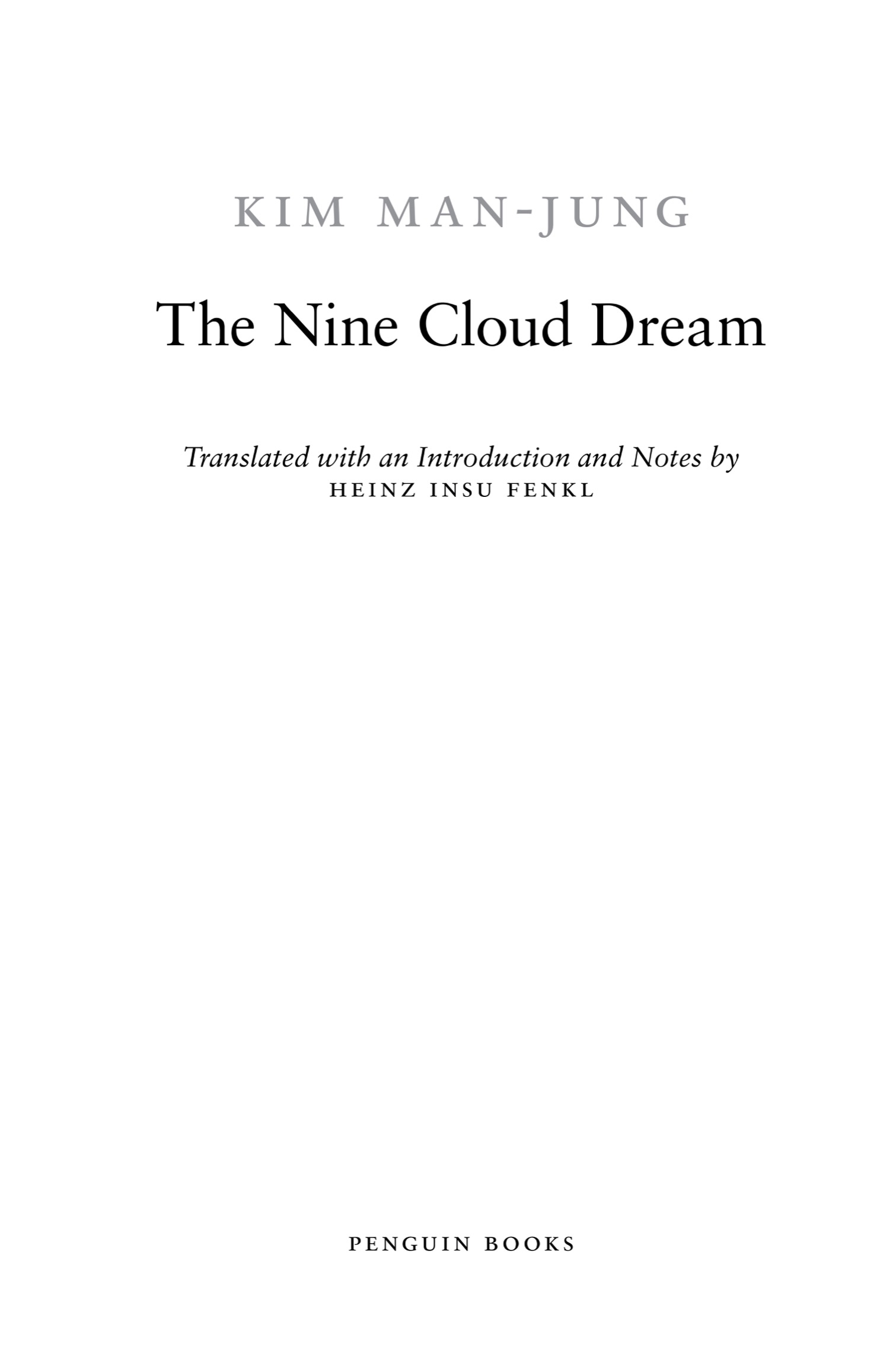PENGUIN  CLASSICS
CLASSICS
THE NINE CLOUD DREAM
KI M MAN-JUNG (16371692) is generally accepted as the author of The Nine Cloud Dream (Kuunmong), often considered the greatest classic Korean novel. He is said to have composed it in exile as a comfort to his mother. A member of the yangban (ruling class) literati, Kim Man-jung rose to become the head of the Confucian Academy. His other works include The Record of Lady Sas Journey South (Sassi Namjeonggi).
HEINZ INSU FENKL is a writer, editor, translator, and folklorist. He is the author of two novels, Memories of My Ghost Brother, a PEN/Hemingway finalist, and Skull Water. He is an associate professor of English at the State University of New York, New Paltz. His nonfiction includes Korean Folktales, which he wrote following a Fulbright fellowship. He serves on the editorial board of Sijo: An International Journal of Poetry and Song and is a consulting editor for Words Without Borders. He is a recipient of the Global Korea Award and the Buddhist Yushim Prize for his contributions to Korean literature. His fiction and translations have been published in The New Yorker.
PENGUIN BOOKS
An imprint of Penguin Random House LLC
penguinrandomhouse.com
Translation, introduction, and notes copyright 2019 by Heinz Insu Fenkl
Penguin supports copyright. Copyright fuels creativity, encourages diverse voices, promotes free speech, and creates a vibrant culture. Thank you for buying an authorized edition of this book and for complying with copyright laws by not reproducing, scanning, or distributing any part of it in any form without permission. You are supporting writers and allowing Penguin to continue to publish books for every reader.
A portion of this book first appeared in different form as The Ghost Story in Azalea: Journal of Korean Literature & Culture, Volume 7, 2014.
Illustrations from The Cloud Dream of the Nine translated by James Scarth Gale (London: Daniel OConnor, 1922). Artwork on comprises portions of these illustrations, assembled by Heinz Insu Fenkl.
LIBRARY OF CONGRESS CATALOGIN G-IN-PUBLICATION DAT A
Names: Kim, Man-jung, 1637-1692, author. | Fenkl, Heinz Insu, 1960-translator, writer of introduction, writer of added commentary.
Title: The nine cloud dream / Kim Man-jung ; translated with an introduction and notes by Heinz Insu Fenkl.
Other titles: Kuunmong. English
Description: New York, New York : Penguin Books, [2019] | Includes bibliographical references.
Identifiers: LCCN 2018036733 (print) | LCCN 2018050575 (ebook) | ISBN 9781524705022 (E-book) | ISBN 9780143131274 | ISBN 9780143131274(paperback) | ISBN 9781524705022(ebook)
Subjects: LCSH: Korean fiction--To 1900--Translations into English.
Classification: LCC PL989.415.M3 (ebook) | LCC PL989.415.M3 K813 2019 (print) | DDC 895.73/2--dc23
LC record available at https://lccn.loc.gov/2018036733
Cover art: FeiFei Ruan
Version_1
Dedicated to Musan Cho Oh-hyun & all my teachers
Contents
THE NINE CLOUD DREAM
Introduction
The world... is like a passing cloud, like an imaginary wheel made by a whirling torch, like a castle of spirits, like the moon reflected in the sea, like a vision, a mirage, a dream.
The Lankavatara Sutra
New readers are advised that this introduction makes certain details of the plot explicit.
The Nine Cloud Dream, or Kuunmong (, c. 1689), is the most elegant of Koreas earliest literary novels and one of the most beloved masterpieces of Korean literature. It is a fantastical romance, full of intrigue and deception, the idealized story-within-a-story of the poor son of an abandoned single mother becoming the veritable golden boy of Confucian culture. Over the course of the narrative, the main character becomes a great poet, musician, diplomat, general, and brother-in-law to an emperor; his romantic partners (wives and concubines) are said to be the eight most beautiful women in the world. But that idealized romance is framed within the story of a promising young monk who learns a profound lesson about worldly desire as he follows the Buddhist path. And so Kuunmongwith all its excellent imitations and reworkings of Chinese Tang poetry, metaphysical conundrums, thinly veiled autobiography, and court satirealso serves as a morality tale dramatizing the themes central to the worldview of a Buddhist artist-intellectual in seventeenth-century Korea. All this is found in a single work.
SEOPO KIM MAN-JUNG AND HIS TIMES
Both Korean and Western scholars are in general agreement that Kim Man-jung , (16371692), also known by his penname Seopo (, , meaning Western Shore, West Bank, or Western Port), is the author of Kuunmong. This is based primarily on Kim Tae-juns seminal 1933 work History of Korean Fiction ( Choson soseolsa) and the reminiscence of Kims grandnephew Yi Jae (16801746) in A Record of Three Government Agencies ( Samgwan-gi). Kim himself never claimed authorship, but the Korean literati of his time not only wrote fictional works like Kuunmong anonymously, but also customarily disavowed authorship of such low works both out of modesty and from fear of sullying their reputations.
Kim was well-known and well regarded in his time. He was a yangban (a member of the ruling class) related to eminent scholars; he was also an intellectual and political figure of some note in the court of King Sukjong, the nineteenth king of the Joseon dynasty. Like Shao-yu, the protagonist of Kuunmong, he became a government minister after getting the highest score on the national civil service examination. The general consensus in the Korean scholarly community is that Kim, a dutiful son whose father died before his birth, wrote Kuunmong during his exile in order to comfort his mother, a highly educated and accomplished woman who had raised him and his brother by herself. The story of Kim composing the whole of Kuunmong in a single night is typical of literary folklore (Lao Tzu, for example, is said to have composed all of the Tao Te Ching in one night); but in Kims case, the story may, in fact, be an associative conflation with the story of his mother, who borrowed the Chinese classics she was too poor to buy for her sons education and hand-copied them overnight before she had to return them the next day.
Kim lived during the latter part of the Joseon dynasty, which lasted from 1392 to 1897. Joseons political and social structures were modeled after Confucian China of the Tang dynasty (618907). The carefully defined Neo-Confucian ideals governing the Five Relationshipsruler to subject, father to son, husband to wife, elder to younger, and friend to friend (all of which privilege men, and which are significantly dramatized and problematized in Kuunmong)were seen as the key to social and political harmony. Meanwhile, Buddhism, which had been a defining characteristic of Korea during the earlier golden age of the Unified Silla (668935), had begun to wane during the Goryeo dynasty (9181392) and was actively suppressed in favor of the social control offered by Neo-Confucianism. During this period, Korean women had gravitated toward Buddhism and made up much of its infrastructure, a fact implicitly invoked by

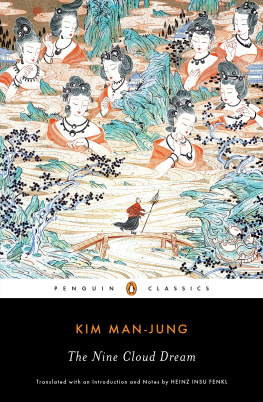

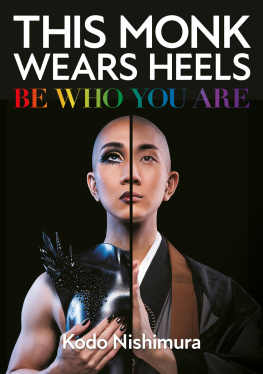
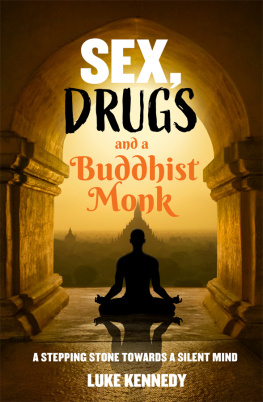
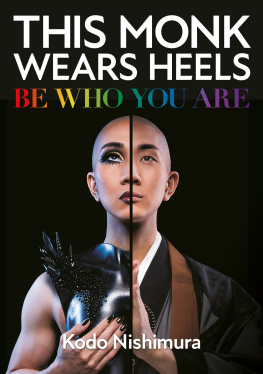

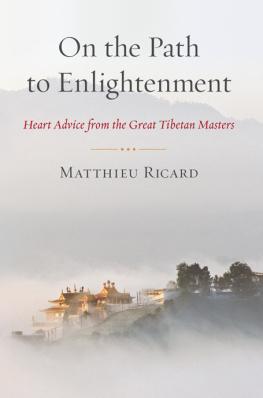
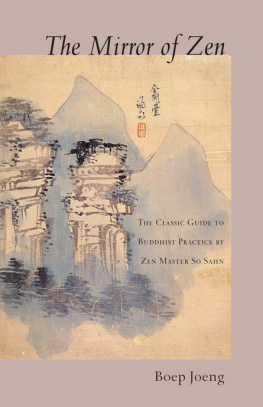
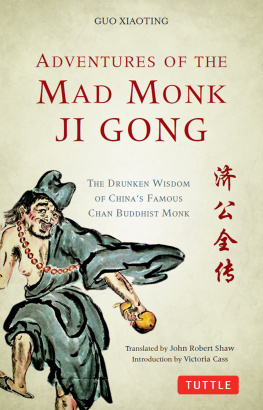
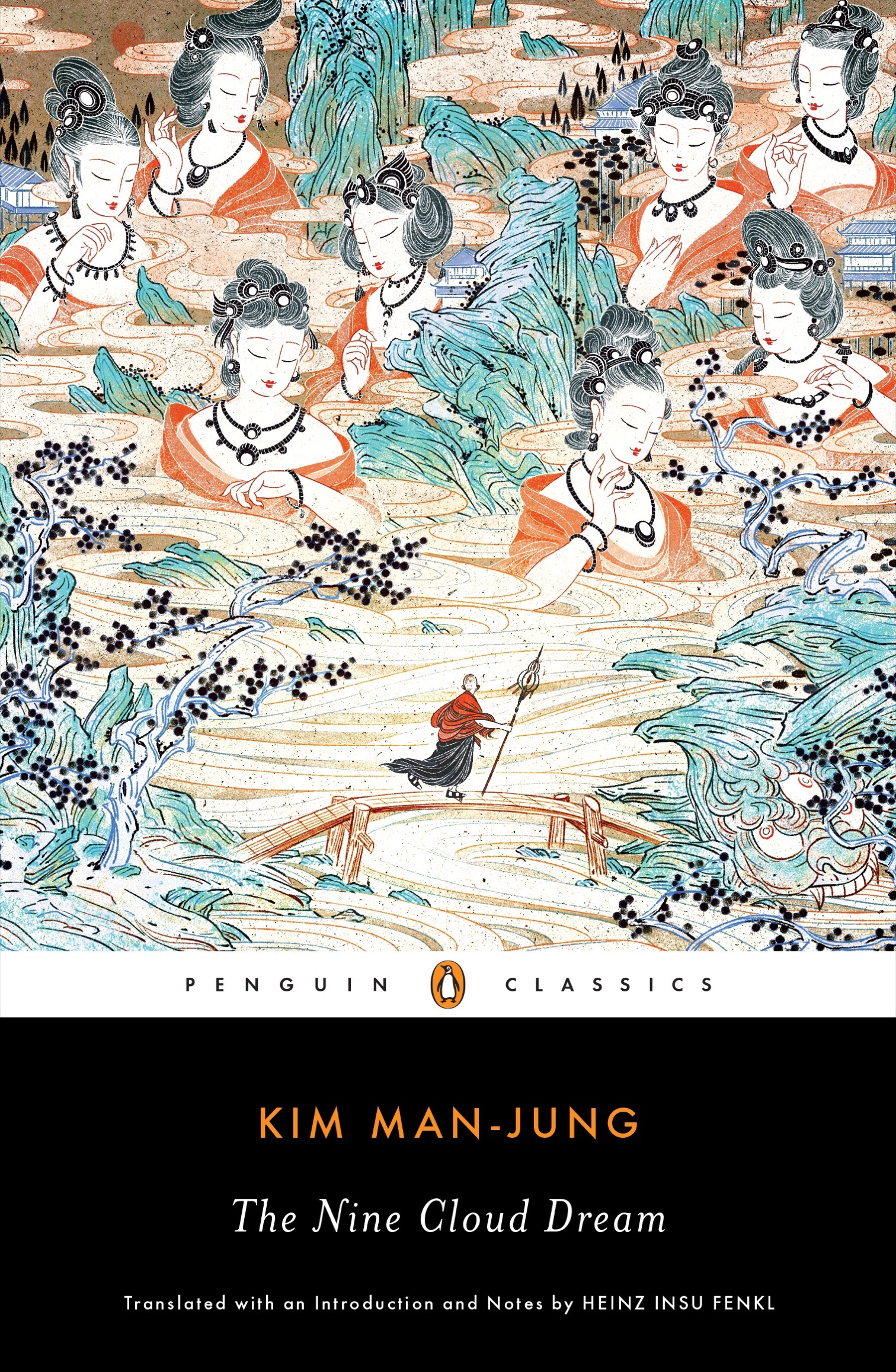
 CLASSICS
CLASSICS